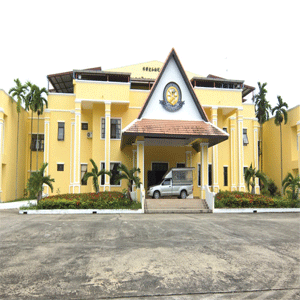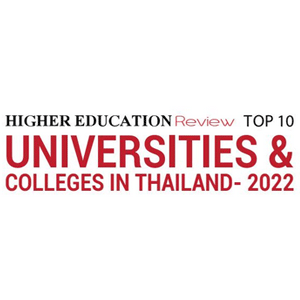
International Buddhist College (IBC): Offering World-Class Non-Sectarian Buddhist Education To Students Across The Globe
By Prof. Dr. Charles Willemen, Rector, IBC
Dating back its origins to 2500 years ago in India, Buddhism has now grown on to become one of the world's most followed religions. Buddhist ideologies have survived the test of time and according to a 2020 survey, around 500 million people across the globe study and practice Buddhism. Established in 2005, International Buddhist College (IBC) is an institute of higher learning that offers different academic programs related to Buddhist thoughts and practices.
The institute operates with the mission to train its students to: a) acquire communicational knowledge and skills in promoting Dhammaduta work, b) acquire basic skills in doing academic research, c) have deep understanding and appreciation for the richness of different Buddhist traditions, and d) be competent in the use of English in teaching the Dhamma. Over the years, IBCs commitment to never compromise on the quality of their education has helped them to develop into one of the most unique Buddhist Colleges in the world.
In this fast moving world, IBC stands apart from the rest and their founding objectives has been the cornerstone behind their success. Talking more about the same, Prof. Dr. Charles Willemen, Rector, IBC adds "IBC was incepted with the five primary founding pillars/objectives and they are: a) To train sangha and serious lay Buddhists to be effective Dhamma teachers of the timeless and universal teaching of the Buddha, b) To promote Buddhist values and to demonstrate the validity and relevance of the Buddhist teachings as the foundation for building a universal humanistic culture for the globalized world, c) To provide a comprehensive and in-depth study of the Buddha's teaching with special emphasis on its application in our daily lives, d) To serve as a center of international Buddhist culture, offering opportunities for intra-religious understanding and fellowship among the three main Buddhist traditions, and e) to promote intra-religious understanding and fellowship among the three Buddhist traditions".
Being the pioneering educational institution they are, IBC allows the students to experience non-sectarian and in-depth study of Buddhism. At the same time, the institute helps the learners to study and understand the different schools, as well as, traditions of Buddhism. In order to offer diverse options to their learners, IBC offers four courses that include B.A. Buddhist Studies, B.A. in Pali and Sanskrit Language & Literature, M.A. Buddhist Studies (International Program), and Ph.D. in Buddhist Studies (International Program).
Both B.A. Buddhist Studies and B.A. in Pali and Sanskrit Language & Literature are 120-credit eight semester programs. Through the B.A. Buddhist Studies program, the institute is aiming to ad-here to liberal arts education norms while at the same time combine it with the continuous inculcation of Buddhist values. The course will be taught in English and it aspires to enrich the lives of their students by educating them on the Buddhist seats of learning like Nalanda and Vikkramasila.
For M.A. Buddhist Studies, learners have the option to choose between an English or Chinese program. This 36-credit four semester program equips the learner to have the required skills, knowledge and wisdom that is needed to serve the world through Buddhist values. This intense program is suited for learners who are passionate and motivated to have a broader knowledge on absorbing all the different facets of Buddhist studies. Aside from that, this program prepares the students on the different methodologies of research, analysis, as well as the presentation of scholarly work in Buddhist studies.
The Ph.D. in Buddhist Studies offered by IBC is a 54-credit program that has a duration ranging from six semesters to six academic years. This course which is available in both English and Chinese strives to nurture ethical professionals in the academic arena or Buddhist-based societies or welfare organizations.
All these programs offered by the institute aspire to help the student reach their true potential. To ensure this, the faculty and the teaching pedagogies at IBC evolve with its learners and help their students in their pursuit of knowing/learning Buddhist ideologies and methods.
Being international is a top priority for IBC and apart from using both English and Chinese as the teaching language, the institute also has students as well as teachers from 20 different countries represented in their campus. IBC operates with a motto of `Bahunam Vata Atthaya' which translates to `For the Good of the Many' and they are members of a global network of Buddhist Studies programs that comprises of the University of British Columbia, the University of Toronto, the University of Hong Kong, and Stanford University. This network also has the support from The Robert H. N. Ho Family Foundation.
Aside from that, instead of pigeonholing their curriculum, IBC in their B.A and M.A Buddhist programs include the teaching and learning of Indian Buddhism, Chinese Buddhism, Tibetan Buddhism, science and Buddhist ideologies, Buddhism in different regions across the globe, Mahayana, Theravada, and language and communication. With a curriculum that is capable of expanding the horizons of their learners, IBC is aiming to become a globally renowned higher education destination for Buddhist studies.
He is a pioneering educator who has studied multiple languages including Latin, Greek, Sanskrit, Chinese, and Japanese. He has done his Ph.D. in East-Asian Studies from the University of Gent, Belgium.
The institute operates with the mission to train its students to: a) acquire communicational knowledge and skills in promoting Dhammaduta work, b) acquire basic skills in doing academic research, c) have deep understanding and appreciation for the richness of different Buddhist traditions, and d) be competent in the use of English in teaching the Dhamma. Over the years, IBCs commitment to never compromise on the quality of their education has helped them to develop into one of the most unique Buddhist Colleges in the world.
The Founding Objectives
In this fast moving world, IBC stands apart from the rest and their founding objectives has been the cornerstone behind their success. Talking more about the same, Prof. Dr. Charles Willemen, Rector, IBC adds "IBC was incepted with the five primary founding pillars/objectives and they are: a) To train sangha and serious lay Buddhists to be effective Dhamma teachers of the timeless and universal teaching of the Buddha, b) To promote Buddhist values and to demonstrate the validity and relevance of the Buddhist teachings as the foundation for building a universal humanistic culture for the globalized world, c) To provide a comprehensive and in-depth study of the Buddha's teaching with special emphasis on its application in our daily lives, d) To serve as a center of international Buddhist culture, offering opportunities for intra-religious understanding and fellowship among the three main Buddhist traditions, and e) to promote intra-religious understanding and fellowship among the three Buddhist traditions".
Being the pioneering educational institution they are, IBC allows the students to experience non-sectarian and in-depth study of Buddhism. At the same time, the institute helps the learners to study and understand the different schools, as well as, traditions of Buddhism. In order to offer diverse options to their learners, IBC offers four courses that include B.A. Buddhist Studies, B.A. in Pali and Sanskrit Language & Literature, M.A. Buddhist Studies (International Program), and Ph.D. in Buddhist Studies (International Program).
Both B.A. Buddhist Studies and B.A. in Pali and Sanskrit Language & Literature are 120-credit eight semester programs. Through the B.A. Buddhist Studies program, the institute is aiming to ad-here to liberal arts education norms while at the same time combine it with the continuous inculcation of Buddhist values. The course will be taught in English and it aspires to enrich the lives of their students by educating them on the Buddhist seats of learning like Nalanda and Vikkramasila.
For M.A. Buddhist Studies, learners have the option to choose between an English or Chinese program. This 36-credit four semester program equips the learner to have the required skills, knowledge and wisdom that is needed to serve the world through Buddhist values. This intense program is suited for learners who are passionate and motivated to have a broader knowledge on absorbing all the different facets of Buddhist studies. Aside from that, this program prepares the students on the different methodologies of research, analysis, as well as the presentation of scholarly work in Buddhist studies.
The Ph.D. in Buddhist Studies offered by IBC is a 54-credit program that has a duration ranging from six semesters to six academic years. This course which is available in both English and Chinese strives to nurture ethical professionals in the academic arena or Buddhist-based societies or welfare organizations.
All these programs offered by the institute aspire to help the student reach their true potential. To ensure this, the faculty and the teaching pedagogies at IBC evolve with its learners and help their students in their pursuit of knowing/learning Buddhist ideologies and methods.
International at its Core
Being international is a top priority for IBC and apart from using both English and Chinese as the teaching language, the institute also has students as well as teachers from 20 different countries represented in their campus. IBC operates with a motto of `Bahunam Vata Atthaya' which translates to `For the Good of the Many' and they are members of a global network of Buddhist Studies programs that comprises of the University of British Columbia, the University of Toronto, the University of Hong Kong, and Stanford University. This network also has the support from The Robert H. N. Ho Family Foundation.
Aside from that, instead of pigeonholing their curriculum, IBC in their B.A and M.A Buddhist programs include the teaching and learning of Indian Buddhism, Chinese Buddhism, Tibetan Buddhism, science and Buddhist ideologies, Buddhism in different regions across the globe, Mahayana, Theravada, and language and communication. With a curriculum that is capable of expanding the horizons of their learners, IBC is aiming to become a globally renowned higher education destination for Buddhist studies.
Prof. Dr. Charles Willemen, Rector, IBC
He is a pioneering educator who has studied multiple languages including Latin, Greek, Sanskrit, Chinese, and Japanese. He has done his Ph.D. in East-Asian Studies from the University of Gent, Belgium.


